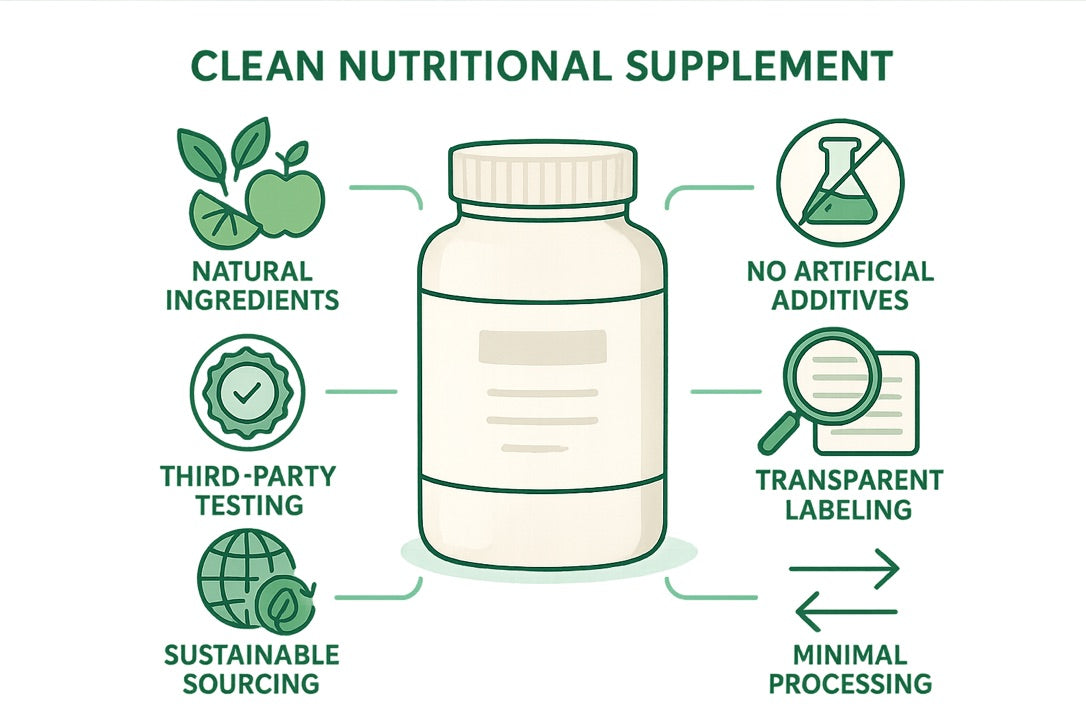
What Makes a Nutritional Supplement “Clean”?
What Makes a Nutritional Supplement “Clean”?
Introduction
The health and wellness market is filled with products claiming to boost energy, sharpen focus, and improve performance. But when you hear the term “clean supplement”, what does that actually mean? More importantly—how do you know if the product you’re using truly meets the standard?
At its core, a clean supplement is about what’s inside—and what’s not inside. It delivers benefits with all natural, non-synthetic ingredients that your body recognizes, absorbs, and uses effectively, without hidden fillers, chemical additives, or harmful stimulants.
Let’s break down exactly what makes a nutritional supplement “clean”—and why choosing wisely matters for your health, performance, and long-term wellness.
1. Clean Energy: Fuel Without the Crash
One of the biggest promises supplements make is energy—but not all energy is created equal.
-
Dirty energy sources (synthetic caffeine, excessive sugars, artificial stimulants) lead to short-lived boosts followed by jitters and energy crashes.
-
Clean supplements use natural caffeine sources—like green tea or green coffee bean—delivering sustained natural energy without jitters or crashes.
For athletes, professionals, or anyone balancing a busy schedule, stable energy is the foundation of lasting performance.
2. Clean Hydration: Electrolyte Support Without Artificial Additives
A truly clean supplement also considers hydration—a key to energy, focus, and recovery.
-
Electrolytes like sodium, potassium, calcium, and magnesium support muscle contractions, nerve communication, and fluid balance.
-
Clean supplements provide hydration support without artificial sweeteners, dyes, or fillers.
Whether you’re working out, fasting, or simply staying active throughout the day, hydration with natural electrolytes ensures your body functions at its best.
3. Clean Brain Support: Cognitive Health Backed by Science
Clean doesn’t just mean physical energy—it also means supporting the mind.
-
Supplements with B-vitamins (B3, B6, B12, and B5) play a critical role in neurotransmitter function, mental clarity, and focus.
-
Instead of synthetic “brain boosters” with questionable safety, clean nootropics use natural pathways to enhance cognitive function support.
This makes a clean supplement ideal not just for athletes, but also for students, professionals, and seniors looking for mental stamina, memory support, and focus.
4. Clean Productivity: More Than Just Energy
Clean supplements go beyond workouts—they help you perform better in life.
-
Students use them as a productivity enhancer for studying and learning.
-
Professionals rely on them for sustained focus and energy throughout demanding days.
-
Active adults and seniors benefit from mental clarity, hydration, and endurance without harsh stimulants.
By combining natural energy, hydration, and cognitive support, clean supplements deliver a holistic boost that adapts to different lifestyles.
5. What’s NOT in a Clean Supplement
Just as important as what’s inside is what’s not inside. A clean supplement avoids:
-
Synthetic fillers or binders
-
Artificial flavors, colors, or dyes
-
Excess sugar or artificial sweeteners
-
Harsh stimulants that cause jittery energy
Transparency matters. If the label isn’t clear, chances are the product isn’t clean.
6. GO Energy & Hydration: A Clean Supplement You Can Trust
At Paragon Nutrition, we designed GO Energy & Hydration to be the definition of clean energy and performance.
Here’s how it delivers:
-
Sustained natural energy from green tea and green coffee bean caffeine—no jitters, no crash.
-
Hydration support with electrolytes like magnesium, sodium, potassium, and calcium.
-
Cognitive health support from B3, B6, B12, and B5 vitamins, enhancing neurotransmitter function.
-
Daily productivity enhancer for professionals, students, athletes, and active seniors.
GO Energy + Hydration Ingredient Benefits
| Ingredient | Clean Function |
|---|---|
| Vitamin B-3 (Niacin) | Converts food into energy; supports cholesterol balance. |
| Vitamin B-6 (Pyridoxine HCl) | Supports brain development, neurotransmitter health, and immunity. |
| Vitamin B-12 (Methylcobalamin) | Enhances focus, boosts energy, supports red blood cells. |
| Vitamin B-5 (D-Calcium Pantothenate) | Metabolizes fats/carbs for energy; supports hormone balance. |
| Calcium (Calcium Lactate) | Strengthens bones, aids muscles, supports nerve signals. |
| Magnesium (Magnesium Citrate) | Supports hydration, muscle/nerve health, immune function. |
| Sodium (Sodium Chloride) | Balances fluids, supports nerves, aids muscle contraction. |
| Potassium (Potassium Chloride) | Regulates blood pressure, supports heart and muscle function. |
| Natural Caffeine (Green Tea & Coffee Bean) | Provides smooth, sustained energy; sharpens mental clarity. |
This unique formulation ensures you’re not just getting energy, but clean, natural support for body and mind.
Conclusion
When you ask, “What makes a supplement clean?”, the answer is simple:
-
It’s about what’s inside—natural, science-backed ingredients that support your body.
-
It’s about what’s not inside—synthetic fillers, artificial additives, or harsh stimulants.
Clean supplements like GO Energy & Hydration along with Creatine Monohydrate from Paragon Nutrition provide sustained natural energy, hydration, mental stamina, and productivity enhancement—without compromise.
If you’re ready to fuel your body and mind with clean energy and focus, Paragon Nutrition is here to help you unlock your best self—naturally.
- #Brain Health
- #Brain Health Support
- #cognitive function suppport
- #Energized
- #Energy and Focus for Seniors
- #Fatigue Reduction
- #Hydration and All Natural Supplements
- #Mental Clarity
- #natural energy booster
- #Natural Nootropics
- #Performance Optimization
- #Performmance optimization
- #Pre-Workout without jitters
- #Productivity Enhancer
- #Supplements for focus
Share

